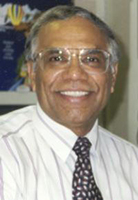IEEE/RSJ International Conference on Intelligent Robots and Systems
Workshop on Robotics for Nanosciences and Nanotechnology
Bally's Las Vegas Hotel and Casino, Las Vegas, NV, October 27, 2003
Panelists

S. Kamal Abdali
The National Science Foundation

S. Kamal Abdali received a Ph.D. in Computer Science from the University of Wisconsin, Madison, in 1974. He has been a computer science faculty member in New York University and Rensselaer Polytechnic Institute, and has held adjunct appointments at Oregon Graduate Institute and the University of Delaware. Prior to joining NSF, he was a principal scientist at the computer research lab in Tektronix, and led the symbolic computation research group there.
His research has spanned the combinatory and lambda calculi, programming language semantics, and computer algebra language and systems design. His current interests include symbolic and algebraic computation, computer algebra systems, and automated theorem proving.
Devendra P. Garg
Army Research Office and Duke University

Devendra P. Garg received his Bachelor of Science degree from Agra University, Bachelor of Engineering degree from University of Roorkee, M.S. in Mechanical Engineering degree from the University of Wisconsin, and a Ph.D. degree from New York University.
Dr. Garg taught at the University of Roorkee first as a Lecturer and later as a Reader in Mechanical Engineering; as an Instructor at New York University; and as an Assistant Professor, and an Associate Professor of Mechanical Engineering at the Massachusetts Institute of Technology (MIT), Cambridge, MA. He was also the Chairman of Engineering Projects Laboratory, a group of eleven individual laboratories, while at MIT. Since 1972, he has been Professor of Mechanical Engineering at Duke University, and Director of the Robotics and Manufacturing Automation (RAMA) Laboratory. From 1977 to 1986 he served as Director of Undergraduate Studies in the Department of Mechanical Engineering and Materials Science at Duke University. As a Fulbright Senior Scholar in 1988, Professor Garg was a Visiting Professor in the Department of Automatic Control Engineering at the Georgian Technical University, Tbilisi, Republic of Georgia. In 1986, he was an invited delegate to the Nuclear Disarmament and Peace Conference held in Kremlin, Moscow along with other international leaders.
While on leave from Duke University from July 1, 1992 until August 31, 1998, Dr. Garg served as Director of the Dynamic Systems and Control Program in the Division of Civil and Mechanical Systems (CMS) at the National Science Foundation, Arlington, VA. There he was appointed as the first Chairman of the Strategic Planning and Evaluation Committee of the Directorate for Engineering (1994-95). He also served as Chairman of the CMS Division's Personnel Search Committee, the Partnership Council, and the Diversity Council. Professor Garg conceived and initiated the NSF's Biannual Workshop for the Advancement and Retention of Underrepresented Minorities and Women Educators in Engineering. In addition, he served as Division Coordinator for the NSF's Faculty Early Career Development (CAREER) Program and Presidential Faculty Fellows (PFF) Program. Subsequently, after returning to Duke University in 1998, he served the Army Research Office in various capacities, thus providing impetus to basic research in mechanical engineering and in facilitating the establishment of close interactions between the universities and government funding agencies.
Thomas LeBrun
National Institute of Standards and Technology
Thomas LeBrun received his Ph.D. in Atomic, Molecular and Optical Physics from University of Paris XI in 1991 for research in inner-shell excitation of atoms and molecules with synchrotron radiation. He then worked in x-ray and atomic physics as a postdoc and staff scientist at Argonne National Lab. Since 1997 he has lead research efforts in nanoscale measurement and technology at the National Institute of Standards and Technology. His current work includes e-beam lithography, optical trapping to assemble and test nanodevices, and subatomic displacement measurement.
Peter Varman
National Science Foundation
Peter Varman is currently serving as a Program Director at the National Science Foundation, in the Division of Computer Communications Research (CCR). He is on rotation from Rice University, where he is an Associate Professor in the Department of Electrical and Computer Engineering. His research interests are in computer architectures, high-performance computing, parallel I/O systems, and resource scheduling. His responsibilities at NSF include the Computer Systems Architecture program and the system architecture component of the Nanoscale Interdisciplinary Research Team program. He has held short-term visiting positions at IBM T. J. Watson and Almaden Research Centers, at Duke University, and at NTU, Singapore. He currently serves on the editorial board of the IEEE Transactions of Computers. He received his B.Tech. In Electrical Engineering from the Indian Institute of Technology, Kanpur, and his M.S. and Ph.D. from the University of Texas at Austin.